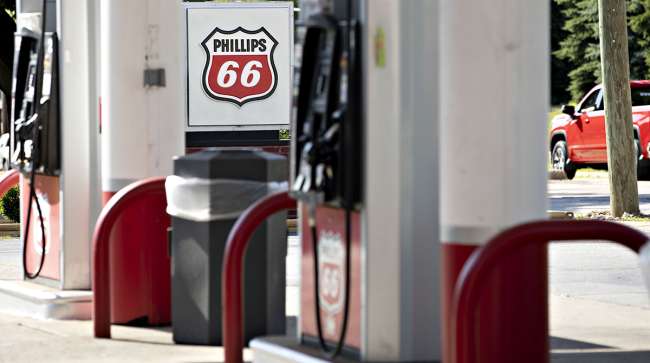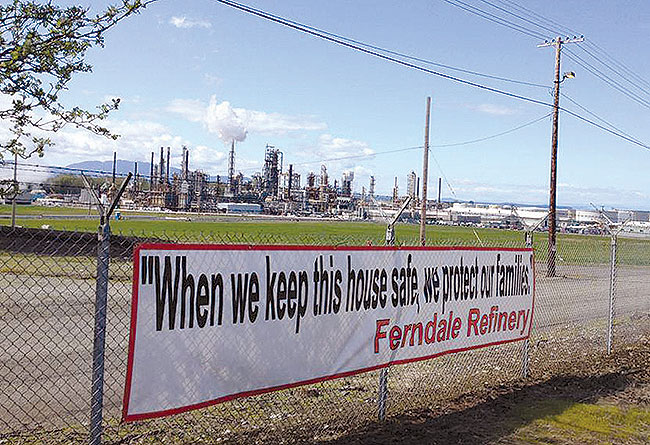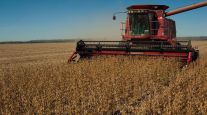Senior Reporter
Phillips 66, REG Halt Development of West Coast Renewable Diesel Plant

[Stay on top of transportation news: Get TTNews in your inbox.]
Refiner Phillips 66 and Renewable Energy Group Inc. announced they have discontinued their joint effort to construct a large-scale renewable fuel plant in Ferndale, Wash., citing permitting uncertainties.
Originally announced in fall 2018, the project — within an existing Phillips 66 refinery — would have resulted in the largest renewable diesel refinery on the West Coast, the companies stated.
“While we believe the Ferndale Refinery is a strategic fit for this renewable diesel project, permitting uncertainties were leading to delays and higher costs,” Robert Herman, Phillips 66 executive vice president of refining, told the Bellingham (Wash.) Herald.

Ferndale Refinery via Facebook
The companies ended the project after the state recently required an environmental impact statement.
The Washington State Department of Ecology is responsible for overseeing state rules that implement the State Environmental Policy Act, “a law that is not new to either REG or Phillips,” said Ecology spokesman Dave Bennett.
State lawmakers enacted SEPA 49 years ago.
“It is unfortunate that the company pulled out, but this is our process. We were following the process that is laid out before us by law,” Bennett said.
The new plant could have produced about 250 million gallons of renewable fuel products per year, including renewable diesel, with minor products of renewable naphtha, renewable propane, and potentially future renewable jet fuel.
Ecology will typically require an EIS for a project of this size and complexity that also has the potential for significant adverse environmental impacts, Bennett said. Potential risks to the environment included vessel traffic, a 7-mile addition to a natural gas pipeline, the potential to disrupt fragile orca, salmon and other marine populations, added greenhouse gas emissions and filling in a wetland.
“Those impacts are significant,” Bennett said.
Requiring an EIS is not unusual, but it likely involves a project delay and adds some risk to the project’s timeline and cost, said Rick Mihelic, president of Mihelic Vehicle Consulting.
“Issues that get identified/discovered need to be resolved, possibly adjudicated, or at least negotiated. This may become fodder for the national debate on rolling back environmental protections versus expediting capital investments and creating jobs,” he said. “Commenting on that possibility is likely a political minefield with likely no winners. Having real examples rather than hypothetical ones is always fuel for these types of debates.”
A spokesman for Phillips 66 told Transport Topics the company expected a timely permitting process and had done “quite a bit of stakeholder outreach so what we didn’t expect was a permitting process that would cause delay.”
An REG spokesman said the company’s relationship with Phillips 66 remains good, and REG continues to work with Phillips 66 on a number of fronts.
Bennett said neither Ecology nor the state of Washington is anti-business.
“I know that the concept of this project was exciting to many people out there,” he said.
The project was moving through the environmental review process on schedule, he said, adding that permitting decisions could possibly have been made as early as mid- to late 2021.
“I am going to take REG and Phillips 66 at their word that they didn’t expect to have to do a full environmental review,” Bennett said.
In part one of a two-part exploration of autonomous technology today, our latest RoadSigns podcast revisits conversations with CEOs Alex Rodrigues of Embark and Cetin Mericli of Locomation. Hear them explain what testing automated trucks and developing platooning technology has taught them about the road ahead — and get new perspective with host commentary. Listen to a snippet from Rodrigues above, and to hear the full episode, go to RoadSigns.TTNews.com.
Meanwhile, Mihelic said renewable diesel comes with both negatives and positives. “Renewable diesel is an improvement in that well-to-wheel it reduces emissions versus petroleum-based diesel, but it’s not zero emission. If the long-term goal is zero emission, RD does not get there.”
However, he noted that it is an interim positive step in the right direction.
There are four other oil refineries within a 50-mile radius of Ferndale, said Eddy Ury, clean energy program manager at RE Sources for Sustainable Communities, based in Bellingham, Wash.
“We weren’t fighting [the Ferndale project]. We were just pushing for the proper amount of environmental review and mitigation conditions, and just wanted to have everything looked at to check the boxes,” he said. “If [Phillips and REG] weren’t prepared to go through this process, then they can’t have been serious about the project, is what it comes down to.”
Want more news? Listen to today's daily briefing:





